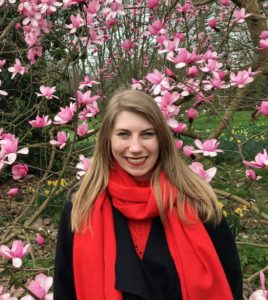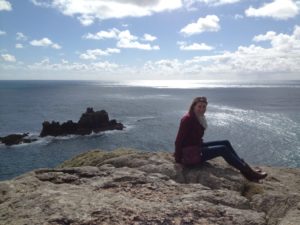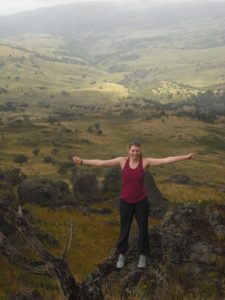Our world-leading marine research underpins a wide range of undergraduate and postgraduate programmes: Research-led teaching | Exeter Marine | University of Exeter. In this #MScGraduateInFocus series we are looking back on some of our MSc graduates who have excelled in conservation around the world since studying with us.
Today we meet Rachael Edwards, MSc Conservation and Biodiversity graduate (2016) and now a PhD student at the University of Waterloo, Canada and working as a Community Champions Project Manager and Volunteer Coordinator for Sustainable Merton, UK

Hi Rachael! Why don’t you tell us a bit about what you have been up to since studying with us?
For my Masters at the University of Exeter, I evaluated the outcomes and outputs of the Marine Turtle Conservation Project in North Cyprus. This research was recently published in the Journal for Nature Conservation. After completing my MSc, I went directly into a PhD programme at the University of Waterloo, Canada, where I study cultural diversity in the use of parks and protected areas and methods of fostering connection to nature. I am now in the final year of my degree. Although my PhD is through a Canadian University, my research is U.K. focused and I have returned to England for field work. I also work part time for a sustainability charity in London.
What did you enjoy about studying in Cornwall?
The smaller size of the Penryn campus created a strong sense of community among the students and faculty. I enjoyed always running into people I knew, both on and off campus. It felt like a campus family and am so thankful for the many friendships I formed over the course of my programme. The surrounding scenery was also breathtaking and there were so many unique habitats to explore.
Campus life, and life in Penryn more generally, was vibrant and laid back at the same time. There were so many clubs to get involved with and, because of the smaller campus, it felt like a very tight knit community. I enjoyed meeting people from outside my program and the campus organizations did a great job of putting on events, organizing trips, and keeping us informed on opportunities to get involved with the wider community.
The combination of Penryn’s beautiful scenery and the friendly campus community is something I think you would be hard pressed to find elsewhere. You really feel like you are a part of a campus family. There were so many opportunities to meet new people, take up a new skill, explore the outdoors, and learn about the Cornish culture right on your doorstep.

Excellent, what skills did you learn that helped you to develop further in your career?
For my PhD, I study outdoor recreation and wellbeing in public open space. The social science research skills I learned while studying at the University of Exeter were invaluable as I began my doctorate and the wide variety of courses and seminars that were offered allowed me to tailor the program to my specific career goals.
The variety of skills and hands-on experiences the course provided were very beneficial as, like many Masters students, I wasn’t exactly sure which direction I wanted to take in my academic journey. This programme exposed us to the many career options that are available, provided the opportunity to learn new research skills, and offered us a wealth of opportunities to contribute to the wider conservation community (I volunteered for the Cornwall Area of Outstanding Natural Beauty during my time in Penryn).
Prior to entering the programme, I didn’t have any experience with social science research methods. Thanks to the numerous courses, lectures, and seminars on human dimensions of conservation offered over the course of my MSc, I left feeling confident in a wide variety of such methods and was inspired to pursue a social science doctorate. Interdisciplinary collaboration is essential for solving complex conservation issues. To promote effective collaboration, it’s important that natural and social scientists are exposed to each other’s research processes and my Masters programme did an exceptional job of this.
I extensively researched Masters programs, and found that the sea turtle conservation work emerging from the University of Exeter’s Marine Turtle Research Group was among the most cited and of a very high standard. I am very thankful to have had the opportunity to contribute to this body of research through recently publishing my MSc dissertation in the Journal for Nature Conservation.

Finally, why did you choose you career and do you have any advice for anyone looking to pursue a similar career?
I grew up interacting with nature on a daily basis and having quality local green space is still essential for my mental health. Through my doctoral research, I aim to promote equity in the planning and management of public open space to improve community health and wellbeing and foster connection to nature. I enjoy the opportunity to speak with a wide range of people as part of my research and appreciate the challenge and creativity that it takes to design green spaces that meet the needs of such diverse communities. I also enjoy the research and scientific writing process as a whole and having the freedom to immerse myself in new areas of inquiry.
The best advice I can give for someone thinking of starting a PhD is to take initiative over your own studies, embrace opportunities that come your way, and follow your research interests, even if they seem like they are in flux. I think one thing that holds people back is worrying about whether they are making the “right” or “wrong” decision for their career path. What I have learned is that you should stay open minded to new opportunities and it’s never too late to change direction. Chances are things won’t go exactly as expected, but what would be the fun in that?
Thank you Rachael!
If you want to find out more about any of our suite of #ExeterMarine Masters and Undergraduate courses use the links below!
- NEW: MSc in Marine Environmental Management
- NEW: MSc in Marine Vertebrate Ecology and Conservation
- MSc in Conservation and Biodiversity
- MSc in Conservation Science and Policy
- MSc in Evolutionary and Behavioural Ecology
- MSc in Sustainable Development
- MSc in Environment and Human Health
- MSc in Renewable Energy Engineering
- BSc Marine Biology
- BSc Zoology
- BSc Environmental Science
- BSc Conservation Biology and Ecology
- BSc Evolutionary Biology
- BSc Animal Behaviour
- BEng Renewable Energy Engineering

